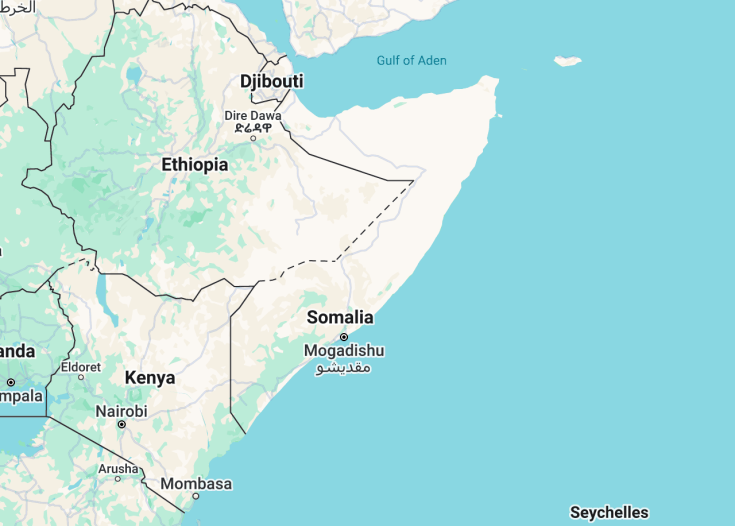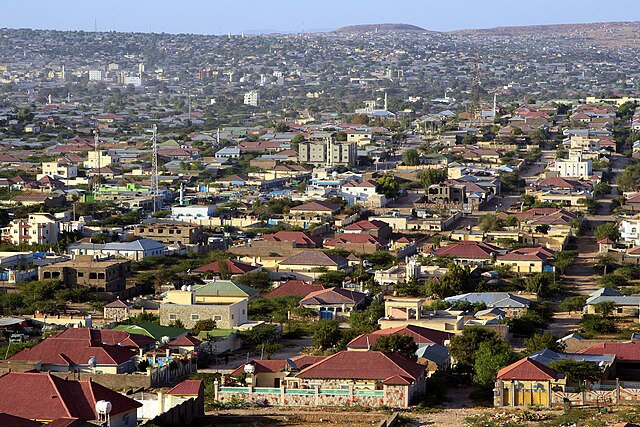Boasting an extensive coastline along the Horn of Africa, Somalia is a nation imbued with rich history and a resilient spirit. From the ancient ruins of Laas Geel, with its prehistoric rock art, to the bustling markets of Mogadishu, the country offers a journey into a lesser-known facet of African heritage. While security concerns have limited tourism, those venturing into Somalia find a wealth of untapped cultural treasures, characterized by hospitable locals and untarnished landscapes.
For safety, always travel with a reputable guide and inform local authorities of your itinerary in advance.
Immerse yourself in Somali culture by sampling local dishes like sambusa and camel milk tea.
Somalia: the land of the midnight sun
| Capital | Mogadishu |
| Time in Somalia | GMT +3 |
| Language spoken | Somali |
| Population | 15.89 million (source: World Bank, 2021) |
| Religion | Islam (Sunni) (99%) Other faiths (<1%) |
| Currency | Somali shilling (Sh, SOS) |
| Airports | Aden Adde International Airport Hargeisa Egal International Airport Kisimayu Airport |
Enveloped by the Horn of Africa, Somalia is a land of contrasts, showcasing an intricate tapestry of history, culture, and natural beauty. It stretches along the eastern coast of the continent, bordering the Indian Ocean. Rich in history, Somalia’s narrative has been penned with tales of thriving ancient empires, trade routes, and a myriad of cultures blending over millennia.
Despite its contemporary challenges, Somalia holds a treasure trove of untapped potential for the intrepid traveler. The ancient ruins of Laas Geel, with its mesmerizing rock art, transports visitors thousands of years back, providing a glimpse into the lives of prehistoric communities. Cities like Mogadishu encapsulate the nation’s complex past and evolving present, offering relics of colonial architecture, historic mosques, and bustling markets.
Geographically, Somalia boasts an extensive coastline, providing an abundance of pristine beaches and coral reefs. Its hinterlands are adorned with scenic landscapes, from rugged mountain ranges to vast plateaus and riverine areas. While the nation is steadily finding its feet in the tourism industry, the appeal lies in its raw and unfiltered beauty, its deep-rooted traditions, and the resilience and warmth of its people.
Where is Somalia located?
Located on the Horn of Africa, Somalia lies on the eastern coast of the continent, flanked by the Indian Ocean. It shares borders with Ethiopia, Djibouti, and Kenya.
What is Somalia famous for?
Somalia is renowned for its historic significance, ancient ruins like Laas Geel, a lengthy coastline with untouched beaches, and a rich tapestry of cultures that have shaped its narrative over centuries.
History
Prehistoric Era: Ancient Civilizations
The Somali Peninsula has long been inhabited by humans, as evidenced by a rich collection of ancient rock art and stone tools found throughout the region. These artifacts point to a history that stretches back thousands of years, indicating that Somalia was a crossroads for early human migrations and civilizations.
1st Millennium BC: Land of Punt
The Land of Punt, an ancient kingdom mentioned in Egyptian records, is believed by many historians to have been located in the region of modern-day Somalia. The ancient Egyptians engaged in trade with the Puntites, particularly in items like frankincense, myrrh, and other valuable goods, showcasing Somalia’s historic importance in global trade networks.
7th to 10th Century AD: Arrival of Islam and the City-States
By the 7th century, Islam began to take root in the Somali Peninsula, introduced by merchants and traders traveling from the Arabian Peninsula. This also marked the emergence of several influential city-states, such as Mogadishu, Barawa, and Zeila. These city-states thrived as trading hubs, connecting Africa, the Middle East, and Asia through maritime networks.
13th to 17th Century: The Age of Empires
Several powerful Somali empires emerged during this period, with the most notable being the Adal Sultanate and the Ajuran Empire. These empires played crucial roles in regional politics and trade, with the Ajuran Empire, in particular, known for its hydraulic engineering and strong centralized administration.
19th Century: Colonial Intrusions
By the 19th century, European powers began to show interest in the Horn of Africa. The British and Italians established protectorates in different parts of Somalia, marking the onset of the colonial era. While the Somali people resisted foreign occupation, the strategic importance of the region, especially the coastal areas, made it a focal point of European colonial ambitions.
20th Century: Path to Independence and Civil Strife
After World War II, a nationalist movement began to take shape, advocating for Somali self-determination and independence. In 1960, British Somaliland and Italian Somaliland merged to form the independent Somali Republic. However, the euphoria of independence was short-lived. By the late 20th century, the country faced mounting challenges, including political instability, military coups, and civil war. The ousting of the Siad Barre regime in 1991 led to a power vacuum, triggering prolonged internal conflict.
21st Century: Rebuilding and Renewal
As Somalia moved into the 21st century, efforts to reestablish stability and governance intensified. With international support, the Transitional Federal Government (TFG) was established in 2004, laying the groundwork for a more permanent political structure. While challenges persist, including threats from extremist groups and ongoing political tensions, there are signs of recovery and hope, as Somalia strives to rebuild its institutions and reclaim its historical significance on the global stage.
Visit Somalia
What to see and do in Somalia
When visiting Somalia, there are several must-see attractions and activities that showcase the country’s natural beauty and rich cultural heritage:
- Explore the ancient ruins of the city of Mogadishu, including the historic architecture, such as the Arba-Rucun Mosque and the Cathedral of Mogadishu.
- Visit the pristine beaches along the Somali coast, such as Lido Beach and Gezira Beach, where you can relax and enjoy the crystal-clear waters.
- Experience Somali cuisine, which is known for its flavorful dishes such as bariis iskukaris (spiced rice) and suugo suqaar (beef stew).
- Discover the traditional Somali music and dance, which are an integral part of the local culture.
- Explore the natural wonders of Somalia, including national parks such as Kismayo National Park and Daallo Mountain, where you can spot diverse wildlife and enjoy outdoor activities.
These are just a few examples of the many experiences awaiting visitors in Somalia. Whether you are interested in history, nature, or cultural immersion, Somalia offers a unique and rewarding travel experience.
Events in Somalia
Somalia hosts various cultural and traditional events throughout the year, offering visitors a chance to experience the vibrant local culture:
One of the most important events in Somalia is Eid al-Fitr, which marks the end of Ramadan and is celebrated with feasts, prayers, and social gatherings. It is a time of joy and giving.
Another significant event is Somali Independence Day, celebrated on July 1st, which commemorates the country’s independence from colonial rule. It is a time of national pride and unity.
Additionally, Somali people celebrate traditional festivals such as the Guled Festival, which includes music, dance, and theatrical performances, showcasing the rich Somali traditions and customs.
These events provide a glimpse into the cultural heritage of Somalia and offer visitors an opportunity to engage with the local community.
Best time to visit Somalia
The best time to visit Somalia is during the dry season, which extends from December to February. During this period, the weather is pleasantly warm, with comfortable temperatures and minimal rainfall. It is the ideal time for outdoor activities, beach visits, and exploring the historical sites of Somalia.
However, it is important to note that Somalia can be volatile due to its political situation. It is advisable to check the travel advisories and consult with local authorities before planning a trip to ensure the safety and security of the visit.
Is Somalia worth visiting?
Somalia offers a diverse range of attractions, including historic sites, stunning landscapes, and a unique cultural heritage. However, it is essential to consider the current security situation and travel advisories before visiting the country.
While Somalia has a turbulent past and ongoing challenges, it is a country that is seeking stability and has the potential to showcase its rich history and natural beauty to tourists. However, due to security concerns, it is recommended to prioritize safety and thoroughly research the situation before planning a visit.













